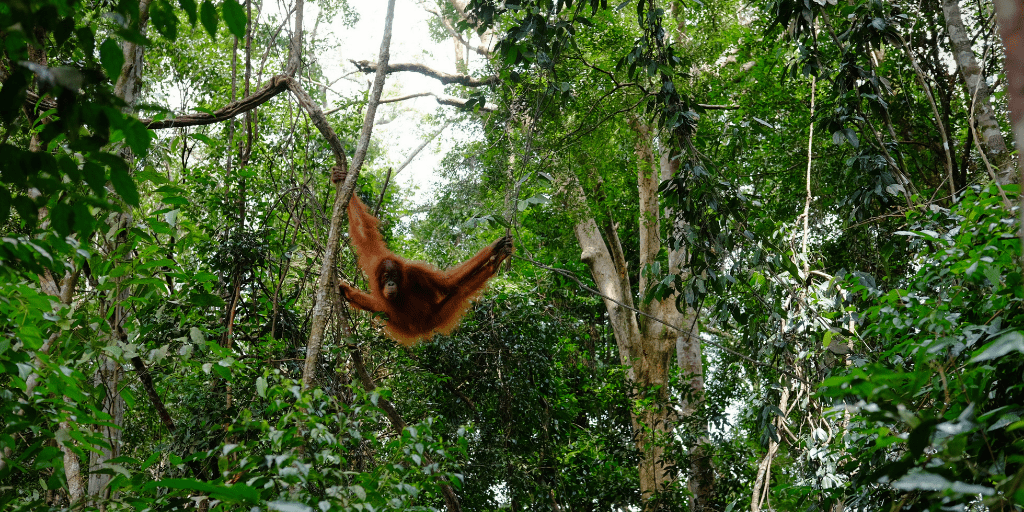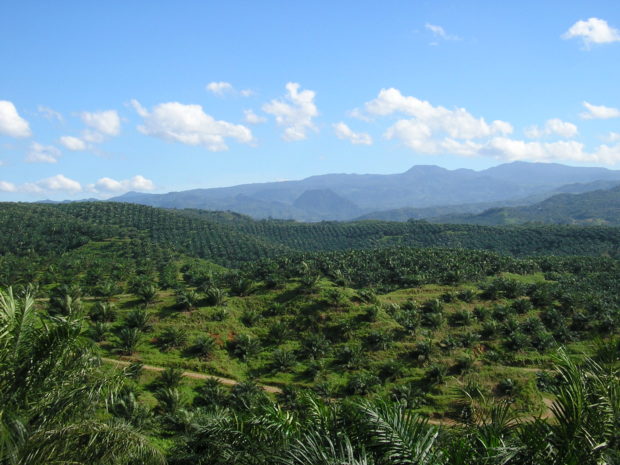We have much more to do and your continued support is needed now more than ever.
Redefining Sustainable Palm Oil: Safeguarding Orangutan Habitat

Palm oil is the world’s most widely used vegetable oil – a key ingredient in everything from chocolate to shampoo. It is pressed from the fruit and seeds of the oil palm tree, which is the highest yielding crop for producing vegetable oil globally.
It is also a major culprit behind deforestation in the tropics – particularly in Southeast Asia, but it is of growing concern in Africa and Latin America as well.
The expansion of commodity agriculture, which grows and trades unprocessed crops, is a dominant cause of overexploitation of global ecosystems. The World Wildlife Fund’s new Living Planet Report cites the planting of cash crops, like oil palm, as driving the clearance of 40 percent of the planet’s once forested land. This is particularly disastrous when it comes to the unique and threatened rainforests of Indonesia and Malaysia, which together account for about 85 percent of global palm oil production. These rainforests are home to some of the planet’s most endangered species. For example, wild orangutans, whose sole habitat is in Indonesia and Malaysia, are seeing huge swaths of their forests cleared for oil palm plantations. Orangutans are listed as Critically Endangered by the International Union for Conservation of Nature Red List. It is estimated that 61.5 percent of Bornean Orangutan habitat will be lost by 2025, a huge threat to the wellbeing of these populations.

So, what is being done about this?
The Roundtable on Sustainable Palm Oil (RSPO) was created in 2004 by industry and environmental organizations to start placing sustainability requirements on oil palm planting and production practices. Palm oil that meets the RSPO’s environmental and social criteria gets certified and tracked through complex international supply chains.
But there have been major criticisms on the stringency of the RSPO Standard. Its Principles and Criteria did not incorporate protections for all forests (like areas that have regrown after a timber harvest, called secondary forests) and peatlands. This meant that pristine and undisturbed forests were prioritized, leaving other valuable areas for wildlife and the climate unprotected. We have written about this topic before – following the publication of an analysis co-authored by National Wildlife Federation on the impact of certification on deforestation – but some exciting steps forward have been made in incorporating further environmental and social safeguards into the RSPO Standard.
Every five years, the Principles and Criteria of the RSPO Standard are reviewed, and on November 15, 2018, the multi-stakeholder members of the RSPO — which includes growers, processors and traders, consumer goods manufacturers, retailers, banks and investors, and social and environmental NGOs — will vote whether to adopt a new global standard for palm oil. The revised standard addresses many areas of concern. It will move much closer in alignment with the more stringent requirements of the Palm Oil Innovation Group (POIG) and incorporate the High Carbon Stock Approach (HCSA) toolkit – a tested methodology and approach for implementing no-deforestation corporate commitments. The National Wildlife Federation has been advocating for further measures to be taken on no deforestation and no peat requirements for years, and will be voting yes on these revisions. We strongly urge other members to vote yes as well.
It is important that as technologies like satellite monitoring advance, granting us greater amounts of improved data, that the RSPO moves agilely and meaningfully to help protect these incredible ecosystems and wildlife, as well as the local communities that rely on them.
Follow our NWF International Twitter for updates following the vote on November 15th, and stay tuned for our next blog post where we’ll break down the major changes in the standard, and reflect on what we think the biggest implications will be.
You can help by retweeting the following:
Palm oil is a major culprit behind deforestation in the tropics! See why we urge fellow members of @RSPOtweets to vote YES on November 15th to adopt the revised, more stringent global standard for palm oil. https://t.co/Pe42G0iABI
— NWF International (@NWF_Intl) November 13, 2018





















